Giants in Their Realms: Close Encounters of the Celebrity Kind
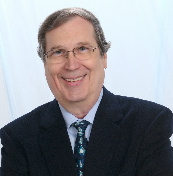
Annex 2 - Reflections on My Okemos High School Teachers
Everything in high school seems like the most important thing that’s ever happened in your life. It’s not. You’ll get out of high school and you never see those people again. All the people who torment and press you won’t make a difference in your life in the long haul. (Mark Hoppus)
As families atomize and home influences deteriorate, the caring teacher may become the most influential adult in a student’s life. (Gordon Sabine [see vignette], The Palm Beach Post, June 26, 1971)
There is, as one grows older, opportunity to look back on how the years spent in high school may have influenced the course of one’s subsequent life. I attended Okemos High School (OHS) in Okemos, Michigan, just a few miles from East Lansing, Michigan and the Michigan State University campus. One OHS classmate recently wrote to me that she had not been inspired by her years at OHS. This prompted me to look back and reflect on whether and, if so, in what way(s) my high school teachers may or may not have influenced my life. Contrary to the Mark Hoppus quote introducing this Annex, while one might never again see one’s teachers from high school, it’s not necessarily the case that one’s high school teachers “won’t make a difference in your life in the long haul.” To the contrary, as Gordon Sabine (see vignette) observed: “the caring teacher may become the most influential adult in a student’s life. Below, in alphabetical order of the teacher’s last name, are some memories of my OHS teachers and how they inspired (or not) my life.
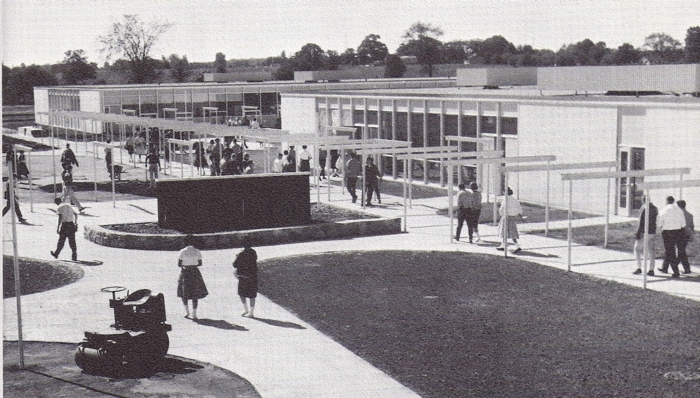
Okemos High School (OHS) Campus (Tomahawk, 1961)

Robert Baker (2/6/20 - 6/26/2011)
Robert Baker (physical education and basketball coach) – I tried hard for four years to make the OHS basketball team but to no avail. But along the way Mr. Baker alerted Mr. Bjorkquist, my biology teacher, that I would be a good prospect for track and cross country. In the 2nd semester of my senior year, perhaps as a sort of consolation prize, Mr. Baker offered to me the opportunity to earn credits as an assistant in his physical education classes. This honor’s other two recipients were Bruce Champion and Gilbert Johnson who, like me, also just missed the cut on making the varsity basketball team.
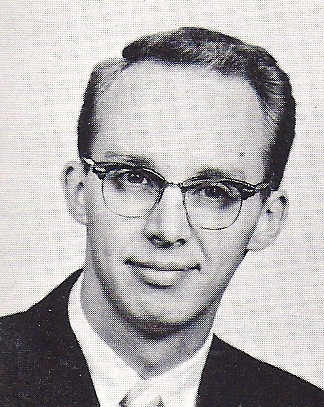
John Bjorkquist
John Bjorkquist (biology and cross country) – Biology was not a favorite subject—and even less cutting into frogs—but Mr. Bjorkquist made the class tolerable and motivated me to be a better runner in cross county, resulting in taking 2nd place in the annual Turkey Trot, losing to a German exchange student (Hans) who sprinted past me in the last 100 yards.
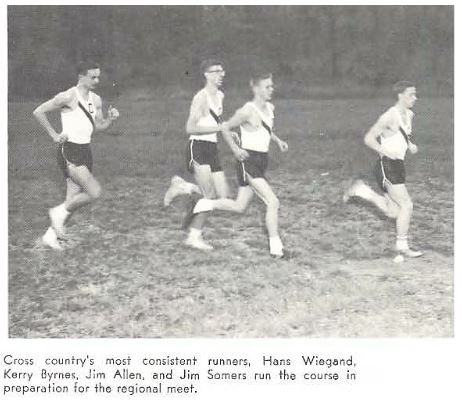
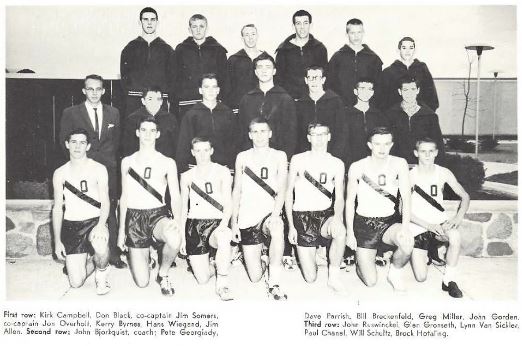
After all that running across the countryside and/or in circles around the track field, I knew that neither sport – track or cross country – was my cup of tea; thus, I didn’t try out for either sport when I became a freshman at Michigan State University.
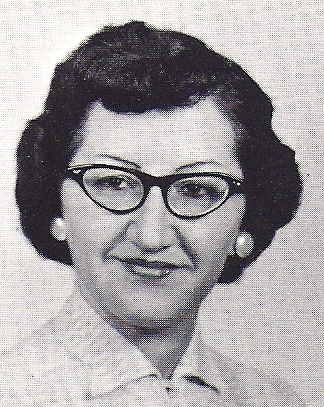
Marcia Boznango (7/14/26 - 9/4/02)
Marcia Boznango (English) – When OHS moved to its new campus facility at the beginning of my sophomore year in 1960, Ms. Boznango’s class was the first of the day. I really don’t have any memories of that class, perhaps a clue that she had little motivational impact on me. She sponsored the school newspaper and yearbook but I found neither extracurricular activity appealing, though years later, in my work for the U.S. Agency for International Development, for several years I edited a monthly newsletter on trade and trade capacity building that I called LAC Trade Matters. This, for a period of time, was an interesting task, even garnering an agency award as a “best practice.” My ability to put that newsletter together on schedule was probably more a credit to my father Francis C. Byrnes who had majored in journalism at Iowa State University, edited the college newspaper, and often helped me with editing my grade school and high school papers.
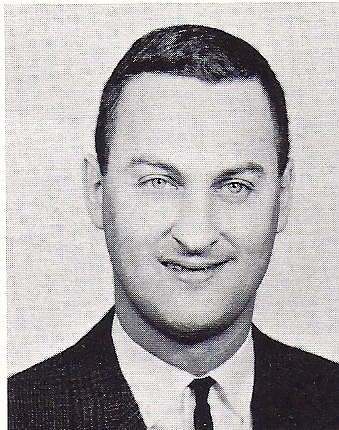
Dale Brubaker (7/16/37 - 6/56/13)
Dale Brubaker (government/economics) – Dale Brubaker (see vignette) was the teacher who most inspired me at OHS. He was enthusiastic about ideas and engaged the students in reading and discussing popular issue-oriented books available as low-cost paperbacks. Mr. Brubaker’s approach to teaching inspired paying attention to him during class and working hard on class assignments, resulting in the only instance where my OHS grades over a semester rose from A- to A to A+. Unfortunately, given that I was in my senior year, I didn’t have other opportunities to take additional courses with Mr. Brubaker. I now see in retrospect that Brubaker sparked in me an interest in social issues, planting a seed that later influenced a decision to major in sociology at MSU. After my first two years at MSU and studying the university course catalogue, I discovered that majoring in sociology would allow me the most flexibility to take courses of interest in other departments, during a period of time in which I remained undecided about what I really wanted to do with my life.

Greta Gary
Greta Gary (world history) – This teacher did not inspire! I was doing fairly well in her world history course until she assigned writing a term paper on “WWI and WWII.” I thought this a rather expansive topic to cover in a term paper—and she hadn’t provided any guidance to trim the topic down to some aspects of these two wars. I blew off the task, calculating that, even with an F, the high marks I had already earned in the course would allow me to salvage at least a B. I’m sure my explanation to her why I didn’t turn in a paper (“even with an F I’ll still pass”) must have grated. Indeed, on the report card, she crossed off a mistakenly written D+ and replaced it with a B-. An unfortunate case study in the pitfalls of having students focused more on studying for grades than on learning. By contrast, learning was so much fun in Brubaker’s class that earning an A was a byproduct of a teacher inspiring such interest in a subject that one focused on learning and not on the grade.
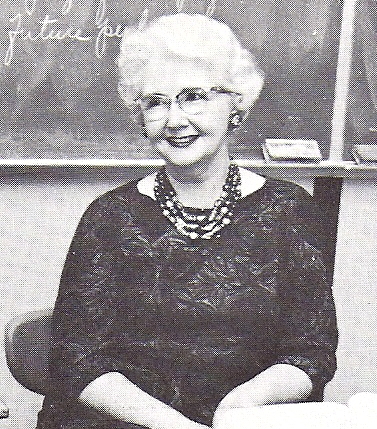
Rachel Freund Grinnell (7/2/03 - 9/30/93)
Rachel Grinnell (English) – I didn’t see eye to eye with Ms. Grinnell, especially with the high heels she wore, but not because I wasn’t “tall” (I already had grown to what would be my adult height of 6’ 1”). I got on her wrong side when, as a freshman, I challenged her in English class that she had thrown words into the spelling bee that were not covered in any of our assignments. I already had brought a chip on my shoulder into Grinnell’s class because of having lost a spelling bee during grade school for spelling “judgment” as “judgement” (both forms are acceptable though the former is apparently the preferred American spelling). I recall that Grinnell had great posture as she walked around the room in high heels, shoulders back and chest out, with my male classmates whispering speculatively that her ability to parade around the classroom with such spectacular posture was learned at a much younger age and in another line of work of less repute. Looking back, my earlier education in English in a parochial primary school provided a better foundation for me in developing such skills as I have as a writer. There I learned how to diagram a sentence, which raised my awareness about how a sentence is constructed and what it needs to contain in order to be complete and not leave a reader pondering what is missing from a sentence that doesn’t make any sense.
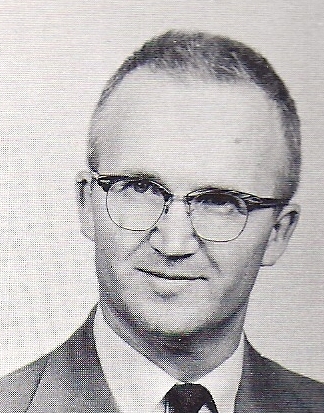
Edward Kapalla (9/18/16 - 6/30/02)
Edward Kapalla (industrial arts) – One learned quickly not to mess with Mr. Kapalla or fool around in his “shop” class, a good thing because he taught respect for the tools/machines we had to work with for our various wood/metal projects. As a result, I survived “shop” class (and projects) without major or even minor injury. My one surviving shop project, a metal/wood candy/nut bowl, is shown below along with images of two other “creations” which had a shorter life span, notably the triangular-shaped cribbage board similar to the one shown below (God only knows what became of it over the years) and a thread spool rack (like the one shown below) that my mother did use at least up to the time that our family moved to the Philippines in 1963.
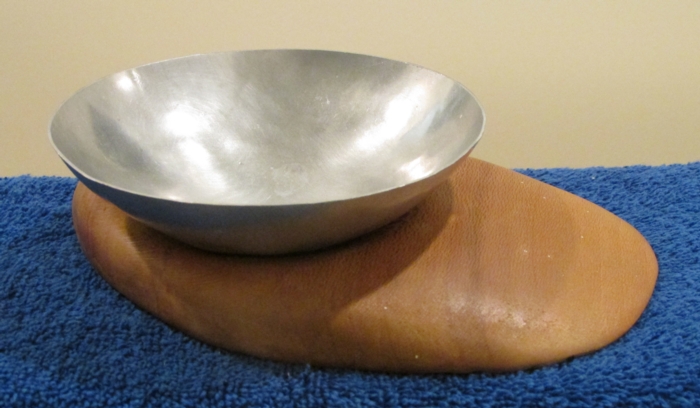


But these projects didn’t inspire me to devote my life to working with metal and wood, nor did industrial arts class equip me with a robust set of domestic skills that would later, as a home owner, be useful in fixing electrical, plumbing, and other problems around the house. Why didn’t “shop” teach us practical skills like how to repair a toilet, replace an electrical outlet, or fix a hole in a wall? Perhaps those were the life skills being taught to the gals and guys over in what was the then-called “home economics” class.

Joy Moore (deceased)
Joy Moore (typing) – “Mr. Byrnes, you had more errors than any other student on the typing test. Please slow down and focus on accuracy.” I ignored her plea and by the time I was a freshman in college was making some extra cash typing term papers for my roommates. By the mid-1970s, I had upgraded from a Royal manual to an IBM Selectric – with my typing speed having increased to 70 wpm w/ three errors and 100 wpm w/ seven errors. This astounded the word processing center secretaries in the organization where I worked at the time. But I can’t give all the credit to Ms. Moore as my mother had previously enrolled me involuntarily in a summer typing class at East Lansing High School. Typing, as one now realizes in the computer age, would become one of the most useful life (or work) skills acquired in my youth, so much so that I now find it very difficult as an adult to pick up a pencil to take notes—perhaps because, as my typing got better, my penmanship got worse, especially handicapped from birth as a lefty.
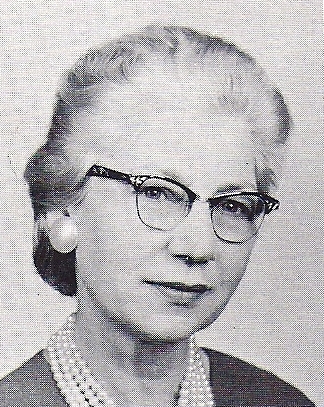
Bertha Mosher (8/20/02 - 9/1/77)
Bertha Mosher (Spanish) – She was my Spanish teacher for three years until I decided I didn’t want to take Spanish 4 (literature). Before the start of my freshman year at MSU, I scored just a few points short of placing into Spanish 3, an indicator that Mrs. Mosher instilled in me a solid foundation of vocabulary and grammar. But it wasn’t until the end of my freshman year, when I traveled to Mexico the summer of 1964 to live with a host family in Toluca, that I really became fluent in Spanish—which I would chalk up as a second valuable life skill, one eventually proving an asset in seeking employment in Colombia for a year as a research associate on a MSU agricultural marketing study; and also a practical asset in meeting the young lady (Sonia Gomez Naranjo) whom I married in 1969 and who has stayed by me 46+ years and counting. My Spanish fluency also helped me for many years in designing and conducting adult-oriented workshops in agricultural extension methods, management communication for development, and organizational management for sustainability. For a while, I even was hooked on watching “telenovelas” (soap operas) on Univision until I saw the story lines as not that much different from one “telenovela” to the next.
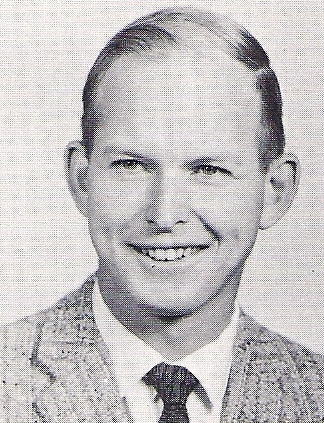
John Nordrum
John Nordrum (geometry and trigonometry) – These two courses were not my cup of tea but John motivated one to keep up with the class, do the homework, and pass the exams, albeit certainly not in my case with flying colors. Over a decade later, after taking Calculus 1 as a graduate student at Iowa State University, I couldn’t recall enough high school “trig” to be able to keep up with Calculus 2. If there was one mistake I made in my selection of courses at MSU, it was not getting at least through Calculus 2 so that I’d have some command of integration which I later discovered to be a missing life skill that made it impossible for me to take more advanced economics and statistics courses at Iowa State University during my doctoral program.

Gary Raymond (4/6/1935 - 10/3/2015)
Gary Raymond (drivers’ education and track) – The funniest teacher I had at OHS – young, hip, and a motivator, especially on the track field when I ran track and cross country. I am a better driver because of “good driver” attitudes instilled by Mr. Raymond. While having never had or caused an accident, I’ve been rear-ended four times, the first tie back in the 1960s driving my grandfather’s car which didn’t have a seatbelt, resulting in severe whiplash. Now I don’t drive unless I have on my seat belt, thus saving me the next three times I was rear-ended.
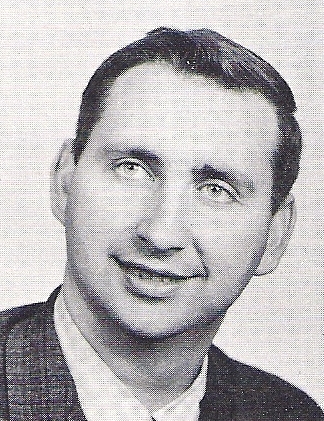
Douglas Richey
Douglas Richey (algebra) – Taking algebra was a struggle, especially as I didn’t see this as a useful life skill. Much later in graduate school when taking Calculus 1, it became clear how important equations were for understanding differentiation. But Mr. Richey hung in there with me one semester as my grade was tanking from A- to B- and then F on two consecutive quizzes. I realized that this wasn’t going to end well, motivating me to get some tutoring from our next-door neighbor (Edward Norton) who was a math teacher at Sexton High School in Lansing, Michigan. By semester’s end, with Mr. Norton’s tutoring and taking practice tests, I wowed Mr. Richey earning an A on the last two tests, salvaging a B- for the course.
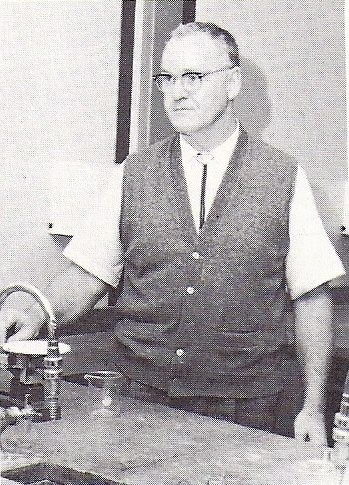
Joseph Walbridge (4/3/15 - 4/4/86)
Joseph Walbridge (chemistry) – Mr. Walbridge engaged the students and I survived, even with my lab partner (Wendy Hamner) and I identified only one of four elements in the qualitative analysis. Mr. Walbridge, impressed by our analytical procedures and logical deduction, yet gave us a B! I didn’t find chemistry interesting or of great relevance, especially with the outcomes of lab “experiments” generally pre-determined, unless one put the class at risk of an explosion for not following procedures. For me chemistry was an exercise in rote learning and the antithesis of studying social issues which I found much more interesting as I later discovered when I took Mr. Brubaker’s government course during my senior year.
What I learned at OHS – The first thing I recall learning at OHS was the “culture shock” I experienced my first day as a freshman. In the last class of the day, I needed to ask a question, so raised my hand. When the teacher recognized me, I stood up to ask my question, immediately realizing that I had not seen any other student stand up all day long and that more than a few students in the room were having a bit of a chuckle over what they had just witnessed. Of course, I brought into the OHS classroom the same way I had asked questions during the previous eight years of having been a student in a Catholic primary school. Standing up to ask a question was a way of showing respect to the nuns who had been my teachers throughout primary school.
But I quickly realized at OHS that there was another world out there different from the parochial schools (St. Michael in Worthington, Ohio and St. Thomas Aquinas in East Lansing, Michigan) that I attended for eight years under the tutelage of dedicated but strict nuns. Perhaps some nuns were much better teachers–and motivators–than others, but this was even clearer when none (no pun intended) of my OHS teachers wore habits that were a constant reminder to be respectful, whether one liked the nun as a teacher or not. And, at OHS, one’s teachers could be women or men, girls didn’t wear the same dreary uniform day in and day out, and I didn’t have to go to Mass every day where I often served as an Altar Boy.
Beyond required courses, one could choose which courses to take and how those would add up to being prepared to go to college. One had to balance studies and extracurricular activities, though in high school and later college I really wasn’t interested in extracurricular activities—and didn’t start dating until my freshman year at Michigan State University (MSU). What I ultimately learned from being a student at OHS really came down not so much to the courses taken or the knowledge and skills acquired but rather to what I learned from interacting with other students and the adults who were my teachers, advisors, activity sponsors, coaches, mentors, and role models (or not).
Some question what is the real value of primary school, middle school, high school, or even college since each is an interim point along the way to growing up, finding one’s place in life, and eventually landing a first job. Indeed, first jobs, part-time in high school, college, or thereafter, be they helping around the house, babysitting, mowing lawns, cleaning dormitory lavatories, and being a factotum in a campus office, may have had a bigger impact on growing up, becoming an adult, and pursuing a professional career.
To the point, the time I spent working in the Michigant State's Office of International Programs; meeting developing country students invited into our home by my parents; attending international films at MSU; and traveling to Europe, Mexico, the Philippines, and other countries, all before graduating from college, opened my eyes, more than any course I took at OHS or later MSU, to a world beyond Worthington, East Lansing, or Okemos that was incredibly more interesting than the one in which I had spent my formative years.
Indeed, that broader world, especially the developing countries of Africa, Asia, and Latin America and the Caribbean would become the focus of my professional life over the coming decades working in international agricultural and rural development.
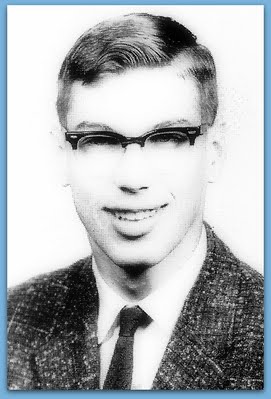
Kerry at OHS
In doing research for this book, I discovered that Okemos, Michigan and Washington, DC (where I now live in nearby Reston, VA) in recent years shared the challenge of transitioning to a new moniker for a hometown team. For Okemos High School, the transition is already underway and reflected below in the school’s old and new logos:


Former Okemos Chieftans logo honored Chief Okemos of the Chippewa Tribe



New Okemos Chiefs logo designs being considered by Okemos High School
As upsetting as it was for many Okemos students, alumni, and fans that the Okemos School Board changed the school’s mascot name and logo, a bigger controversy brews here in Washington, DC where there is a clamor for Dan Snyder, owner of the National Football League Washington Redskins team, to change the team’s name.
Controversies such as the above, however, were not on my mind during my 7th-8th grade school years at St. Thomas Aquinas (see Father Mac vignette) or during my secondary school years at Okemos High School. However, what often was on my mind were the melodies and lyrics of the pop songs of the day.
The following provides a partial listing of my favorite pop songs from those years (1957-63).
1957 – Little Darlin’ (Diamonds)
1957 – Diana (Paul Anka)
1957 – Round and Round (Perry Como)
1957 – Honeycomb / Kisses Sweeter Than Wine (Jimmie Rodgers)
1958 – Volare (Nel Blu Dipinto Di Blu) (Domenico Modugno)
1958 – Catch A Falling Star / Magic Moments (Perry Como)
1959 – Venus (Frankie Avalon)
1959 – Dream Lover (Bobby Darin)
1959 – Broken-Hearted Melody (Sarah Vaughan)
1959 – The Big Hurt (Miss Toni Fisher)
1959 – Pretty Blue Eyes (Steve Lawrence)
1960 – Footsteps (Steve Lawrence)
1960 – Mission Bell (Donnie Brooks)
1960 – Dreamin’ (Johnny Burnette)
1960 – Poetry in Motion (Johnny Tillotson)
1960 – A Thousand Stars (Kathy Young with The Innocents)
1960 – You’re Sixteen (Johnny Burnette)
1960 – Corinna, Corinna (Ray Peterson)
1961 – Rubber Ball (Bobby Vee)
1961 – Spanish Harlem (Ben E. King)
1961 – Runaway (Del Shannon)
1961 – A Hundred Pounds of Clay (Gene McDaniels)
1961 – Travelin’ Man / Hello Mary Lou (Ricky Nelson)
1961 – Portrait of My Love (Steve Lawrence)
1961 – Moody River / Speedy Gonzales (1962) (Pat Boone)
1961 – Raindrops (Dee Clark)
1961 – This Time (Troy Shondell)
1961 – Tonight (Could Be the Night) (The Velvets)
1961 – Calendar Girl / Happy Birthday Sweet Sixteen (Neil Sedaka)
1961 – Angel Baby (Rosy & the Originals)
1962 – Duke of Earl (Gene Chandler)
1962 – Johnny Get Angry (Joanie Sommers)
1962 – The Loco-Motion (Little Eva)
1962 – I Remember You (Frank Ifield)
1962 – Venus in Blue Jeans (Jimmy Clanton)
1962 – Bobby’s Girl (Marcie Blane)
1962 – Sealed with a Kiss (Brian Hyland)
1962 – I Remember You (Frank Ifield)
1962 – Rhythm of the Rain (The Cascades)
1963 – Blame It on the Bossa Nova (Eydie Gormé)
1963 – Our Day Will Come (Ruby & The Romantics)
1963 – Can’t Get Used To Losing You (Andy Williams)
1963 – I Will Follow Him / Hello Heartache, Goodbye Love (Little Peggy March)
1963 – Sukiyaki (Kyu Sakamoto)
1963 – Then He Kissed Me (The Crystals)
1963 – Be My Baby (The Ronettes)
1963 – Fools Rush In (Ricky Nelson)
1963 – Forget Him (Bobby Rydell)
1963 – Alice in Wonderland (Neil Sedaka)
1963 – Your Other Love (Connie Francis)

